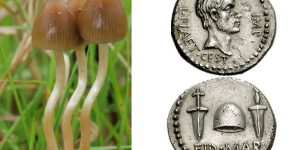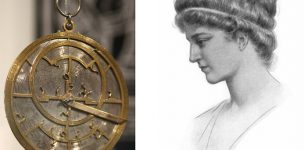Cassandra: Greek Goddess Who Foretold Cursed Prophecies
A. Sutherland - AncientPages.com - In Greek mythology, Cassandra was the daughter of King Priam and Queen Hecuba of Troy. She was the most beautiful of Priam's daughters and an inspired prophetess.
Pythia at Delphi, the Sibyls, and even an unfortunate Trojan princess, Cassandra, were regarded as 'brides of the god.'
Cassandra in front of city of Troy. Image credit: E. De Morgan (1898, London) - Public Domain
Apollo's love for Cassandra was so strong that he decided to give her the gift of prophecy, which she wanted to possess so much. With this power, Cassandra could foretell what would happen in the future. In return, he was promised to get her sexual favors, but Cassandra decided to refuse his advances.
She broke her promises, which made Apollo very angry. Unfortunately, he could not take back his gift because divine powers, once granted, might not be revoked. The only thing Apollo could do was make Cassandra's gift without account, so no one ever believed her.
It was god Apollo's only revenge for what she had done to him. Now, Cassandra was cursed by him, and so were her prophecies.
Even when Cassandra stands before the palace in Argos, foretelling her imminent death and that of Agamemnon, no one believes her. The chorus of elders claims they cannot or must not believe her. (Aeschylus' Agamemnon (1072-1330).
Homer's Iliad mentions or alludes to many Greek legends and myths. In the famous epic, Cassandra predicted many tragic events of the Trojan War, a legendary conflict between the early Greeks and the people of Troy in western Anatolia, dated by later Greek authors to the 12th or 13th century BC.
One is related to Priam's son Paris who planned a trip to Sparta. Cassandra warned against this trip, but her warnings were ignored. Each time she told the Trojans what would happen, they would never listen to her warnings.
 Woodcut illustration of Cassandra's prophecy of the fall of Troy (at left) and her death (at right), from an incunable German translation by Heinrich Steinhöwel of Giovanni Boccaccio's De mulieribus claris, printed by Johann Zainer (de) at Ulm ca. 1474. Image: kladcat - CC BY 2.0
Woodcut illustration of Cassandra's prophecy of the fall of Troy (at left) and her death (at right), from an incunable German translation by Heinrich Steinhöwel of Giovanni Boccaccio's De mulieribus claris, printed by Johann Zainer (de) at Ulm ca. 1474. Image: kladcat - CC BY 2.0
Paris traveled to Sparta, where he kidnapped Helen. In Greek mythology, Helen of Troy, also known as Helen of Sparta, was the daughter of Zeus. The abduction of Helen by Paris, Prince of Troy, started the Trojan War with Greece.
Another Cassandra's prediction was also a serious warning. The prophetess predicted Troy's defeat and warned the Trojans not to accept the Greek gift of the Trojan horse, but her prophecy was ignored. Greek troops hid inside the Trojan Horse, which suddenly appeared and captured the city of Troy.
After the Greek victory, Cassandra was given a prize by the Greek leader Agamemnon, the son of King Atreus and Queen Aerope of Mycenae. Later, she returned to Greece with him and their twin boys, Teledamus and Pelops.
However, she also had yet another prediction in her mind. She predicted a terrible fate awaited her and Agamemnon. And so it happened, when they reached Agamemnon's home in Mycenae, they were both killed by Agamemnon's wife, Clytemnestra, and her lover, Aegisthus. Also, their children were killed.
Cassandra was sent to the Elysian Fields after her death because her soul was judged worthy due to her dedication to the gods and her piety during her life.
Cassandra's burial place was believed to be located at Amyclae or Mycenae. The two towns disputed the possession of the prophetess' grave. Heinrich Schliemann, a German archaeologist, considered the modern discoverer of prehistoric Greece, was confident that he found Cassandra's tomb during his excavations at Mycenae. Schliemann found the remains of a woman and two infants in one of the circle's graves at the site.
Written by - A. Sutherland - AncientPages.com Senior Staff Writer
Updated on March 15, 2024
Copyright © AncientPages.com All rights reserved. This material may not be published, broadcast, rewritten or redistributed in whole or part without the express written permission of AncientPages.com
Expand for referencesMore From Ancient Pages
-
 Baba Yaga Lego Created By Russian Artist Brings Classic Slavic Mythological Figures To Life
Myths & Legends | Feb 23, 2021
Baba Yaga Lego Created By Russian Artist Brings Classic Slavic Mythological Figures To Life
Myths & Legends | Feb 23, 2021 -
 Can Stonehenge Be Saved From Bulldozers Or Have Druids Been Defeated?
News | Nov 10, 2020
Can Stonehenge Be Saved From Bulldozers Or Have Druids Been Defeated?
News | Nov 10, 2020 -
 Teotihuacan’s “Incense Burner Of Life And Death” On Display For The First Time
Archaeology | Dec 16, 2025
Teotihuacan’s “Incense Burner Of Life And Death” On Display For The First Time
Archaeology | Dec 16, 2025 -
 Ancient History Of The Samurai Armor
Featured Stories | Aug 27, 2018
Ancient History Of The Samurai Armor
Featured Stories | Aug 27, 2018 -
 Oldest English Book On Cheese Reveals Some Surprising Secrets
Archaeology | Apr 30, 2025
Oldest English Book On Cheese Reveals Some Surprising Secrets
Archaeology | Apr 30, 2025 -
 Was The Discovery Of Biblical Abel’s Giant Grave In Syria Covered-Up?
Ancient Mysteries | Oct 28, 2014
Was The Discovery Of Biblical Abel’s Giant Grave In Syria Covered-Up?
Ancient Mysteries | Oct 28, 2014 -
 Ancient Secrets Of Polish Ciemna Cave Inhabited By Humans 120,000 Years Ago
Featured Stories | Nov 22, 2016
Ancient Secrets Of Polish Ciemna Cave Inhabited By Humans 120,000 Years Ago
Featured Stories | Nov 22, 2016 -
 Baffling Encounters With Mysterious Underground Humanoids Guarding A “Giant Hand”
Featured Stories | Aug 14, 2025
Baffling Encounters With Mysterious Underground Humanoids Guarding A “Giant Hand”
Featured Stories | Aug 14, 2025 -
 Evidence Of Extensive Human Fire Use 50,000 Years Ago
Archaeology | Jul 9, 2025
Evidence Of Extensive Human Fire Use 50,000 Years Ago
Archaeology | Jul 9, 2025 -
 Seven New Ancient Buddhist Caves – One With ‘A Harmika’ – Discovered In Mumbai
News | Jan 19, 2016
Seven New Ancient Buddhist Caves – One With ‘A Harmika’ – Discovered In Mumbai
News | Jan 19, 2016 -
 Ancient Mud-Brick Roman Ovens And Massive Wall Dated To Egyptian Late Period Unearthed In Luxor
Archaeology | Jun 26, 2020
Ancient Mud-Brick Roman Ovens And Massive Wall Dated To Egyptian Late Period Unearthed In Luxor
Archaeology | Jun 26, 2020 -
 Strange Tale How The Liberty Cap Mushroom Got Its Name Starts In Ancient Rome
Featured Stories | Sep 3, 2023
Strange Tale How The Liberty Cap Mushroom Got Its Name Starts In Ancient Rome
Featured Stories | Sep 3, 2023 -
 Magnetic Field From 9,000 Years Ago Teach Us About The Magnetic Field Today
Archaeology | Aug 17, 2021
Magnetic Field From 9,000 Years Ago Teach Us About The Magnetic Field Today
Archaeology | Aug 17, 2021 -
 Hypatia Of Alexandria – Brilliant, Controversial Scientist And Her Dramatic End
Featured Stories | Jan 7, 2019
Hypatia Of Alexandria – Brilliant, Controversial Scientist And Her Dramatic End
Featured Stories | Jan 7, 2019 -
 Nuraghe Culture And Trace Connections Between Sardinia And Scandinavia
Archaeology | Sep 12, 2025
Nuraghe Culture And Trace Connections Between Sardinia And Scandinavia
Archaeology | Sep 12, 2025 -
 Feud Between The Medici And The Borgia Families – What Caused The Renaissance Clash?
Featured Stories | Mar 5, 2019
Feud Between The Medici And The Borgia Families – What Caused The Renaissance Clash?
Featured Stories | Mar 5, 2019 -
 3,000 Years Ago Human Activity Destroyed Vegetation And Irreparably Damaged The Timna Valley Environment
Archaeology | Sep 23, 2022
3,000 Years Ago Human Activity Destroyed Vegetation And Irreparably Damaged The Timna Valley Environment
Archaeology | Sep 23, 2022 -
 Oldest Door Lock Comes From Ancient Egypt
Ancient History Facts | Jun 27, 2018
Oldest Door Lock Comes From Ancient Egypt
Ancient History Facts | Jun 27, 2018 -
 Forgotten Ancient Ugarit: One Of The Flourishing And Oldest Cities Of Canaan
Featured Stories | Oct 27, 2025
Forgotten Ancient Ugarit: One Of The Flourishing And Oldest Cities Of Canaan
Featured Stories | Oct 27, 2025 -
 Circular-Shaped 4000-Year-Old Wooden Henge Discovered In Yorkshire, Historic County of Northern England
Archaeology | Jan 3, 2018
Circular-Shaped 4000-Year-Old Wooden Henge Discovered In Yorkshire, Historic County of Northern England
Archaeology | Jan 3, 2018

